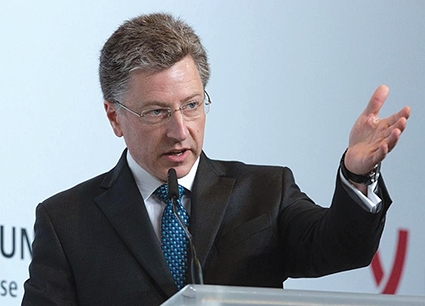US Special Envoy to Ukraine: A Reason to Hope
EXCLUSIVE INTERVIEW
With all the politics drama that’s going on in Ukraine at the moment, mostly thanks to Georgia’s divisive ex-President, GEORGIA TODAY and Panorama TV Show approached the US special envoy in Ukraine, Kurt Volker, who found time from his busy conference schedule to chat with us for a while about things like Western influence, Georgia’s place in US politics and of course, the abovementioned politics in Ukraine.
You spoke at the conference about the West being a set of values and ideas rather than Geography. From that standpoint, is the US still the West it used to be? With what’s been going on there during Trump’s presidency, how viable a preacher for western democracy and values can America be for countries like Georgia?
I would say absolutely, because we are strong and resilient as a country. We are people who are passionately committed to freedom and democracy; we have strong democratic institutions; we have vibrant media; we have very strong rule of law; we have branches of the government; judiciary and legislative branches that are very healthy and independent that are playing an important role in our society. So, while we have political disagreements and differences between political parties, the overall institutions of our country, I would argue, are some of the strongest of any country in the western world.
After Bush’s tenure, Obama shifted the policy focus away from Georgia. People hoped that with Trump coming into power, that focus would come back, yet it didn’t
First of all, we have to remember that the US Vice President visited Georgia just a month ago. So that is already a high level of attention. There have been US-Georgia military joint exercises and steady cooperation in other fields. There is a firmly robust agenda there. But, then again, you make a valid point: the Obama Administration for many years did seem to downgrade its relationship with Georgia. In the Trump Administration, we’ve seen stronger rhetorical support. We’re talking about the occupation again. I’m talking about support of Georgia’s territorial integrity and sovereignty and building that relationship. It’s on a good trajectory.
You were recently appointed the special Envoy to Ukraine. What is your assessment of the recent events (the Saakashvili saga) there?
The first thing I’d say is that I think Ukraine has a lot of important work to do in reforms, economic reforms, security, dealing with the conflict, reaching out to the people in Donbass, and this is really a distraction in many ways. I don’t think this kind of dramatization is helpful to anybody in Ukraine or elsewhere as Ukraine has really important, serious work to do. In addition, I think it would be damaging and polarizing to Georgian politics if Saakashvili was extradited to Georgia. I know there is a request out there but I hope that it stays pretty much as it is. Ukraine needs to demonstrate that it is a rule of law state, be it from the perspective of the president and seeing that laws and rules are applied, or from former president Saakashvili’s perspective. If he is challenging something, then he has access to courts. So, it needs to be done legally.
There are claims regarding Misha’s agenda, that there could be another revolution in Ukraine
I don’t think that would serve anyone’s interests, especially not those of the Ukrainian people. They have all the institutions for a vital, healthy democracy. They need good leaders who get elected and who work hard within those institutions. Revolution, such as the Rose Revolution, can be understood as there being a complete blockage in the system. There is no such blockage in Ukraine.
What are the perspectives for the peace process in eastern Ukraine?
I think we are facing a window of opportunity right now. This is still a hot war in eastern Ukraine, not a frozen conflict. It is not working out very well for Russia both in terms of international reputation and increasing information about their role there. From the perspective of sanctions, from the perspective of being an impediment for improving US-Russia relations, from the perspective of Ukraine itself becoming stronger with a national identity looking westward: none of these things is what Russia wanted. And so, there is reason to hope that Russia can change what it is doing and, if so, then we can help to find a way to improve security, make sure that Russian speaking people do not feel threatened, create the time and space necessary for the implementation of the Minsk agreements which results in the territory being restored to Ukrainian sovereignty. That’s the ideal scenario. I think there’s an opportunity to work on this right now. We’ll see how it goes.
Vazha Tavberidze












